大学英语专业泛读教程4(第四单元课文讲解)
- 格式:ppt
- 大小:1.02 MB
- 文档页数:8
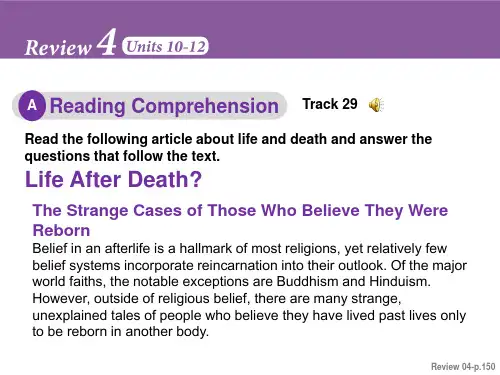
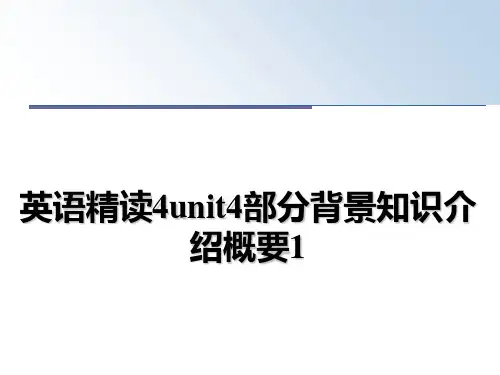
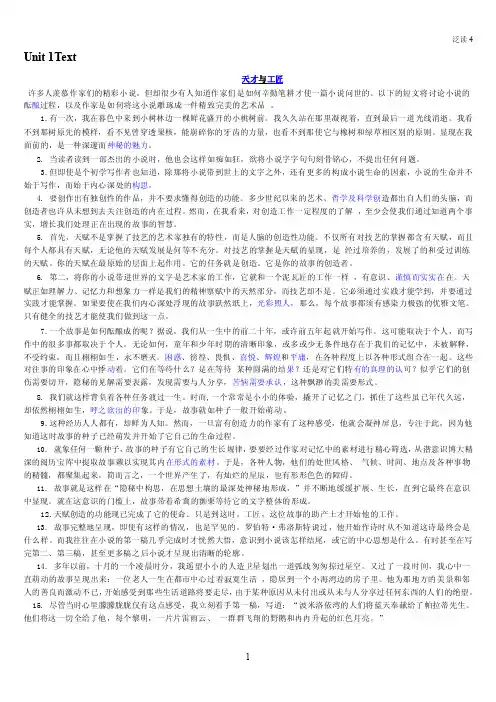
Unit 1Text天才与工匠许多人羡慕作家们的精彩小说,但却很少有人知道作家们是如何辛勤笔耕才使一篇小说问世的。
以下的短文将讨论小说的酝酿过程,以及作家是如何将这小说雕琢成一件精致完美的艺术品。
1.有一次,我在暮色中来到小树林边一棵鲜花盛开的小桃树前。
我久久站在那里凝视着,直到最后一道光线消逝。
我看不到那树原先的模样,看不见曾穿透果核,能崩碎你的牙齿的力量,也看不到那使它与橡树和绿草相区别的原则。
显现在我面前的,是一种深邃而神秘的魅力。
2. 当读者读到一部杰出的小说时,他也会这样如痴如狂,欲将小说字字句句刻骨铭心,不提出任何问题。
3.但即使是个初学写作者也知道,除那将小说带到世上的文字之外,还有更多的构成小说生命的因素,小说的生命并不始于写作,而始于内心深处的构思。
4. 要创作出有独创性的作品,并不要求懂得创造的功能。
多少世纪以来的艺术、哲学及科学创造都出自人们的头脑,而创造者也许从未想到去关注创造的内在过程。
然而,在我看来,对创造工作一定程度的了解,至少会使我们通过知道两个事实,增长我们处理正在出现的故事的智慧。
5. 首先,天赋不是掌握了技艺的艺术家独有的特性,而是人脑的创造性功能。
不仅所有对技艺的掌握都含有天赋,而且每个人都具有天赋,无论他的天赋发展是何等不充分。
对技艺的掌握是天赋的显现,是经过培养的,发展了的和受过训练的天赋。
你的天赋在最原始的层面上起作用。
它的任务就是创造。
它是你的故事的创造者。
6. 第二,将你的小说带进世界的文字是艺术家的工作,它就和一个泥瓦匠的工作一样,有意识、谨慎而实实在在。
天赋正如理解力、记忆力和想象力一样是我们的精神禀赋中的天然部分,而技艺却不是。
它必须通过实践才能学到,并要通过实践才能掌握。
如果要使在我们内心深处浮现的故事跃然纸上,光彩照人,那么,每个故事都须有感染力极强的优雅文笔。

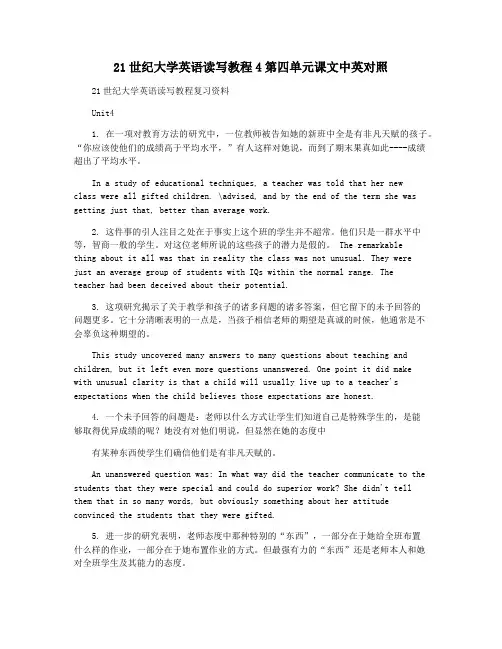
21世纪大学英语读写教程4第四单元课文中英对照21世纪大学英语读写教程复习资料Unit41. 在一项对教育方法的研究中,一位教师被告知她的新班中全是有非凡天赋的孩子。
“你应该使他们的成绩高于平均水平,”有人这样对她说,而到了期末果真如此----成绩超出了平均水平。
In a study of educational techniques, a teacher was told that her newclass were all gifted children. \advised, and by the end of the term she was getting just that, better than average work.2. 这件事的引人注目之处在于事实上这个班的学生并不超常。
他们只是一群水平中等,智商一般的学生。
对这位老师所说的这些孩子的潜力是假的。
The remarkablething about it all was that in reality the class was not unusual. They werejust an average group of students with IQs within the normal range. Theteacher had been deceived about their potential.3. 这项研究揭示了关于教学和孩子的诸多问题的诸多答案,但它留下的未予回答的问题更多。
它十分清晰表明的一点是,当孩子相信老师的期望是真诚的时候,他通常是不会辜负这种期望的。
This study uncovered many answers to many questions about teaching and children, but it left even more questions unanswered. One point it did makewith unusual clarity is that a child will usually live up to a teacher's expectations when the child believes those expectations are honest.4. 一个未予回答的问题是:老师以什么方式让学生们知道自己是特殊学生的,是能够取得优异成绩的呢?她没有对他们明说,但显然在她的态度中有某种东西使学生们确信他们是有非凡天赋的。
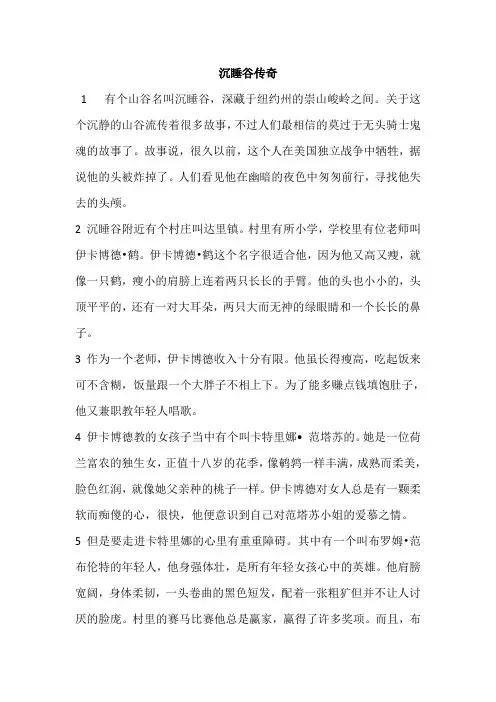
沉睡谷传奇1 有个山谷名叫沉睡谷,深藏于纽约州的崇山峻岭之间。
关于这个沉静的山谷流传着很多故事,不过人们最相信的莫过于无头骑士鬼魂的故事了。
故事说,很久以前,这个人在美国独立战争中牺牲,据说他的头被炸掉了。
人们看见他在幽暗的夜色中匆匆前行,寻找他失去的头颅。
2 沉睡谷附近有个村庄叫达里镇。
村里有所小学,学校里有位老师叫伊卡博德•鹤。
伊卡博德•鹤这个名字很适合他,因为他又高又瘦,就像一只鹤,瘦小的肩膀上连着两只长长的手臂。
他的头也小小的,头顶平平的,还有一对大耳朵,两只大而无神的绿眼睛和一个长长的鼻子。
3 作为一个老师,伊卡博德收入十分有限。
他虽长得瘦高,吃起饭来可不含糊,饭量跟一个大胖子不相上下。
为了能多赚点钱填饱肚子,他又兼职教年轻人唱歌。
4 伊卡博德教的女孩子当中有个叫卡特里娜• 范塔苏的。
她是一位荷兰富农的独生女,正值十八岁的花季,像鹌鹑一样丰满,成熟而柔美,脸色红润,就像她父亲种的桃子一样。
伊卡博德对女人总是有一颗柔软而痴傻的心,很快,他便意识到自己对范塔苏小姐的爱慕之情。
5 但是要走进卡特里娜的心里有重重障碍。
其中有一个叫布罗姆•范布伦特的年轻人,他身强体壮,是所有年轻女孩心中的英雄。
他肩膀宽阔,身体柔韧,一头卷曲的黑色短发,配着一张粗犷但并不让人讨厌的脸庞。
村里的赛马比赛他总是赢家,赢得了许多奖项。
而且,布罗姆总是骑着马。
伊卡博德要赢得卡特里娜的心,必须打败这样一个敌人。
6 稍微强壮、聪明的男人都会知难而退,但是伊卡博德有自己的计划。
他无法公开和敌人决斗,所以他悄悄地、秘密地进行。
他经常拜访卡特里娜家的农庄,使她认为他是在帮助她提高唱歌水平。
7 时间流逝,村里的人都认为伊卡博德将赢得这场竞争。
星期天晚上再也看不到布罗姆的马出现在卡特里娜家。
8 到了秋天,一天伊卡博德受邀到范塔苏家参加一个盛大的派对。
他穿上他最好的衣服。
因为去参加派对要走很远的路,一位农夫借给他一匹老马。
9 布罗姆•范布伦特骑着他那匹跑得最快的名为“鬼见愁”的马来到派对。
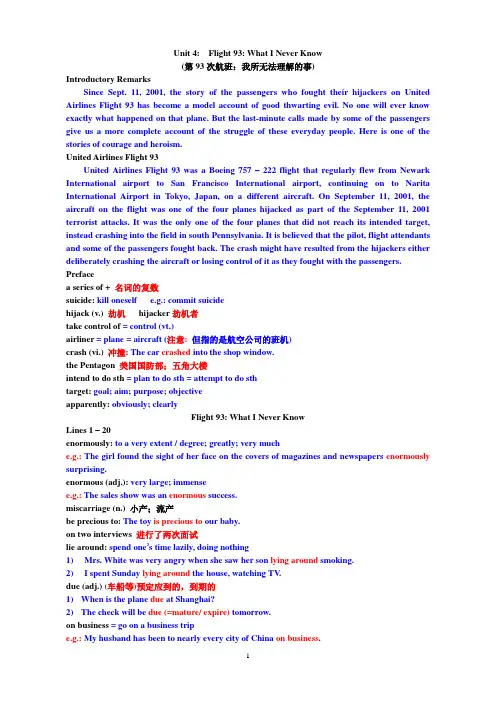
Unit 4: Flight 93: What I Never Know(第93次航班:我所无法理解的事)Introductory RemarksSince Sept. 11, 2001, the story of the passengers who fought their hijackers on United Airlines Flight 93 has become a model account of good thwarting evil. No one will ever know exactly what happened on that plane. But the last-minute calls made by some of the passengers give us a more complete account of the struggle of these everyday people. Here is one of the stories of courage and heroism.United Airlines Flight 93United Airlines Flight 93 was a Boeing 757 –222 flight that regularly flew from Newark International airport to San Francisco International airport, continuing on to Narita International Airport in Tokyo, Japan, on a different aircraft. On September 11, 2001, the aircraft on the flight was one of the four planes hijacked as part of the September 11, 2001 terrorist attacks. It was the only one of the four planes that did not reach its intended target, instead crashing into the field in south Pennsylvania. It is believed that the pilot, flight attendants and some of the passengers fought back. The crash might have resulted from the hijackers either deliberately crashing the aircraft or losing control of it as they fought with the passengers. Prefacea series of + 名词的复数suicide:kill oneself e.g.: commit suicidehijack (v.)劫机hijacker劫机者take control of= control (vt.)airliner = plane = aircraft (注意:但指的是航空公司的班机)crash (vi.) 冲撞: The car crashed into the shop window.the Pentagon 美国国防部;五角大楼intend to do sth= plan to do sth = attempt to do sthtarget: goal; aim; purpose; objectiveapparently: obviously; clearlyFlight 93: What I Never KnowLines 1 – 20enormously: to a very extent / degree; greatly; very muche.g.:The girl found the sight of her face on the covers of magazines and newspapers enormously surprising.enormous (adj.): very large; immensee.g.: The sales show was an enormous success.miscarriage (n.) 小产;流产be precious to: The toy is precious to our baby.on two interviews 进行了两次面试lie around: spend one’s time lazily, doing nothing1)Mrs. White was very angry when she saw her son lying around smoking.2)I spent Sunday lying around the house, watching TV.due (adj.)(车船等)预定应到的,到期的1)When is the plane due at Shanghai?2)The check will be due (=mature/ expire) tomorrow.on business = go on a business tripe.g.: My husband has been to nearly every city of China on business.particularly: above all; very greatlytake care of = look after feed– fed – fedbathe (v.) = have / take a bathdress (vt.): put on clothes: weare.g.: Our 4 years old child can dress himself daily.make sure = be suretuck塞: Please tuck the books in that suitcase.wave: (of a person) move one’s hand to and fro or up and downe.g.: Mary leaned out the window and waved to her friends.flight航班get in: arrive We didn’t get in until 3 o’clock in the morning.screw it: (impolite) (used in the imperative to express one’s anger or irritation about sth or sb.) 让…见鬼去; 该死Compare: catch --- grab --- seize --- graspUnited Flight 93联合航空公司的第93次航班Lines 21 – 41Fumble (vi.): move the fingers or hands awkwardly in search of sth or in an attempt to do sth1)Jack fumbled at the bedtable for his glasses.2)Tom took out a cigarette and then fumbled in his coat pocket for a lighterfumble with:1)My old father is fumbling with his black tie.2)Grandpa fumbled with a huge set of keys and unlocked the gate.lid (壶等的)盖doughnut炸圈饼image:picture / sightpoke (v.): be visible coming (through a hole etc.); push sharply with a stick or one’s finger显现,露出; 戳1)You’ll poke someone in the eye with that umbrella if you are not careful!2)His elbow was poking out through his torn shirtsleeve.the tower’s silver skin这里指银色的外墙hold out递过take over: occupy headband束发带“only have good thoughts”只往好处想shake:tremble nauseate:cause to feel sick; vomit使作呕make it:be successful at sth1)It’s hard to make it to the top in IT business.2)She’s very ambitious, but I don’t think she’ll really make it.curse:swear (at)咒骂,诅咒e.g.: She cursed him for destroying her life.Lines 41 – 75Yeah: OkWh-word + ever = no matter + wh-word(引导让步状语从句时)如:Wherever you go, I will follow you. = No matter where you go, I will follow you.Note: 引导宾语从句时,不能改!如: I don’t understand whatever you do. 不能改成I don’t understand no matter what you do. Do I tell him?我是否该告诉他?blow (blew / blown) up:explode; be destroyed by an explosione.g.: The plane blew up in midair because of a fuel leak.scream: cry sharplyherd (n.): group e.g.: a herd of deer / sheep / cattleherd (v.): move or drive (a group of people or animals) in a specific directione.g.: There are many World War II stories of the Jews being herded on to trains headed for the death-camps.pilot: plane driver yell: cry loudly or violentlye.g.: Don’t yell at the boy in such a way.cockpit:(飞机上的)驾驶舱jolt (n.&v.):sudden bump or shake, jerk; (fig.) an emotional shock 震动, 震惊, 摇晃in the rear (of):at the back (of a vehicle, etc.)e.g.: The old lady was sitting in the rear of the church, praying to God.in sb’s hands: being dealt with or cared for by sb.e.g.: The future of our nation is in our (own) hands.take a vote:投票, 表决bluff: try to deceive (sb) by pretending to be stronger, braver, more in control or knowledgeable, etc. than one is虚张声势, 吓唬1)John seems to know a lot about music, but sometimes I think he’s only bluffing.2)Tom bluffed the doorman into thinking that he was a reporter, so the latter let him up intothe building.Lines 76 – 95“screams in the background”隐隐约约的尖叫声Compare:need to do / need to be done = need + 动名词e.g.:The room needs to be cleaned / cleaning.right (adv.) = just it = phonegag (v.): be unable to swallow and feel as if you are about to bring up food from your stomach; choke; put sth into the mouth to stop (sb) from speaking 作呕;噎住;塞住…的嘴使不能说话sink (n.):large basin in a kitchen, used especially for washing dishes, etc. (厨房中的)洗涤槽gagged over the sink在水槽上呕吐起来They’re doing it. 他们正干上了Compare: be bound to do = must do / be bound for = leave fore.g.: We are bound to liberate Taiwan.e.g.: The train is bound for Beijing.muffle (v.):make a sound or the sound of (sth) less easy to hear使声音低沉或轻微roller coaster过山车couch = sofadesert (vt.):抛弃;离弃;从…处丧失1)All my confidence deserted me when I walked into the exam room.2)He deserted his wife and child for another woman.collide (vi.) with: (of moving objects or people) strike violently against sth or each other (相互)冲撞e.g.: Yesterday two cars collided with each other here.Note:must + 完成式:表示过去一定做过的事e.g.: You must have seen the film.hang up the phone = stop using the phonee.g: Let me speak to my son before you hang up (the phone).give sb a hug= embrace sbdumbfound (vt.): make (sb) speechless with surprise; astonish使惊呆; 使吓得麻木dumbfounded(adj.):Father felt dumbfounded when his son had committed such a crime.manage to do =try one’s best to docan’t manage anything but to do (another thing) = can manage nothing but to do (another thing) 无法只能做成某事1)He needs the apartment for marriage. He can’t manage anything but to borrow money fromhis parents and friends.2)That lady can manage nothing but to declare divorce with her evil husband.sink in: (of words, etc.) be fully understood搞懂; 明白e.g.: Mrs. Johnson had to repeat her words several times before they finally sank in (= understood).I collapsed on the floor.我瘫倒在地上e.g.: The collapsed desk should be repaired immediately.Lines 96 – 118“searching for Jeremy”寻找杰里米Over the next months在接下的几个月里endurable = can be endured unendurable =cannot be enduredendure (vt.) = put up with ; bearCompare:endurable products /goods; unendurable products /goods --- perishable products /goodscrash site (=place / spot)hunger to do / for = be eager to do /for = want very much to doe.g.: How much Mary hungers for love!viewpoint = opinionNote: from one’s viewpoint (point of view); in one’s opinionmake sense (of) = understand (sth), esp. sth difficult or complicated1)I’ve read the article twice, but I can’t make any sense of it.2)When her mother and father separated, Libby was too young to make sense of what wasgoing on.principle原则; 原则性declare war on / against …: 向…宣战be jealous of:envy / be envious ofTo show how tough (=strong) they were?为了炫耀其强悍?overstep (vt.): go beyond the limits of 超越…的范围; 越轨e.g.: The government official is bound to be punished for his overstepping his power.tread (v.): set one’s foot down; walk or step (践)踏; 踩1)I kept treading on my boyfriend’s toes when we were dancing.2)His co-worker was jealous of his skills and popularity and so warned him not to tread onher territory at work.ancient sensibilities: It refers to age-old sensibilities such as religious sensibilities自古以来的理性/情感Now it’s gone如今一切全完了Jeremy always suspected he had a higher purpose: Jeremy always thought He was destined (注定) to perform a noble mission (崇高的使命) in life。
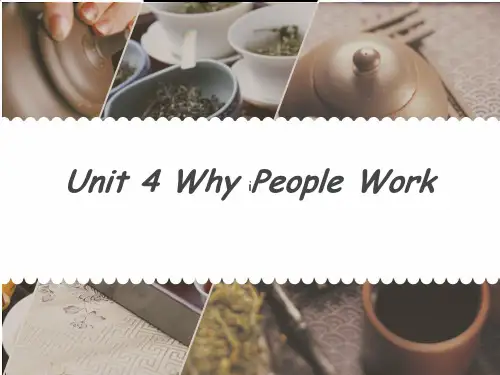
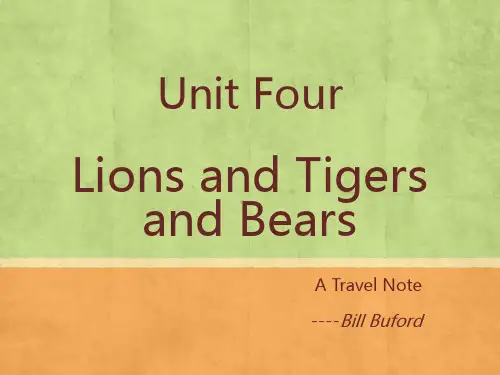
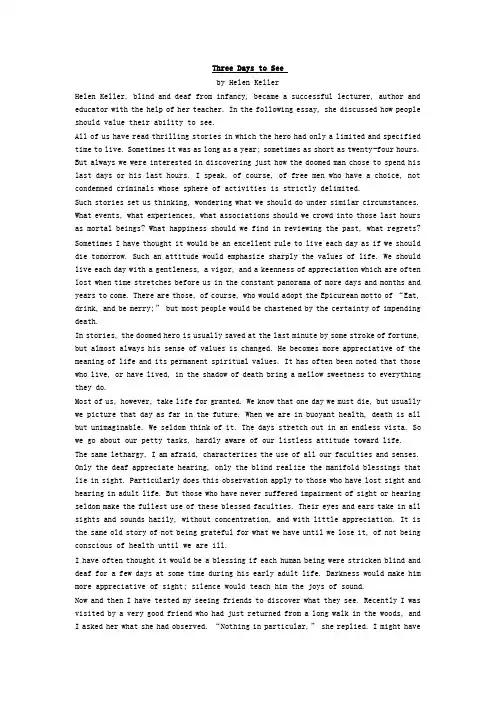
Three Days to Seeby Helen KellerHelen Keller, blind and deaf from infancy, became a successful lecturer, author and educator with the help of her teacher. In the following essay, she discussed how people should value their ability to see.All of us have read thrilling stories in which the hero had only a limited and specified time to live. Sometimes it was as long as a year; sometimes as short as twenty-four hours. But always we were interested in discovering just how the doomed man chose to spend his last days or his last hours. I speak, of course, of free men who have a choice, not condemned criminals whose sphere of activities is strictly delimited.Such stories set us thinking, wondering what we should do under similar circumstances. What events, what experiences, what associations should we crowd into those last hours as mortal beings? What happiness should we find in reviewing the past, what regrets? Sometimes I have thought it would be an excellent rule to live each day as if we should die tomorrow. Such an attitude would emphasize sharply the values of life. We should live each day with a gentleness, a vigor, and a keenness of appreciation which are often lost when time stretches before us in the constant panorama of more days and months and yea rs to come. There are those, of course, who would adopt the Epicurean motto of “Eat, drink, and be merry;” but most people would be chastened by the certainty of impending death.In stories, the doomed hero is usually saved at the last minute by some stroke of fortune, but almost always his sense of values is changed. He becomes more appreciative of the meaning of life and its permanent spiritual values. It has often been noted that those who live, or have lived, in the shadow of death bring a mellow sweetness to everything they do.Most of us, however, take life for granted. We know that one day we must die, but usually we picture that day as far in the future. When we are in buoyant health, death is all but unimaginable. We seldom think of it. The days stretch out in an endless vista. So we go about our petty tasks, hardly aware of our listless attitude toward life.The same lethargy, I am afraid, characterizes the use of all our faculties and senses. Only the deaf appreciate hearing, only the blind realize the manifold blessings that lie in sight. Particularly does this observation apply to those who have lost sight and hearing in adult life. But those who have never suffered impairment of sight or hearing seldom make the fullest use of these blessed faculties. Their eyes and ears take in all sights and sounds hazily, without concentration, and with little appreciation. It is the same old story of not being grateful for what we have until we lose it, of not being conscious of health until we are ill.I have often thought it would be a blessing if each human being were stricken blind and deaf for a few days at some time during his early adult life. Darkness would make him more appreciative of sight; silence would teach him the joys of sound.Now and then I have tested my seeing friends to discover what they see. Recently I was visited by a very good friend who had just returned from a long walk in the woods, and I asked her what she had observed. “Nothing in particular,” she replied. I might havebeen incredulous had I not been accustomed to such responses, for long ago I became convinced that the seeing see little.How was it possible, I asked myself, to walk for an hour through the woods and see nothing worthy of note? I who cannot see find hundreds of things to interest me through mere touch. I feel the delicate symmetry of a leaf. I pass my hands lovingly about the smooth skin of a silver birch, or the rough shaggy bark of a pine. In spring I touch the branches of trees hopefully in search of a bud, the first sign of awakening Nature after her winter's sleep. I feel the delightful, velvety texture of a flower, and discover its remarkable convolutions; and something of the miracle of Nature is revealed to me. Occasionally, if I am very fortunate, I place my hand gently on a small tree and feel the happy quiver of a bird in full song. I am delighted to have the cool water of a brook rush through my open fingers. To me a lush carpet of pine needles or spongy grass is more welcome than the most luxurious Persian rug. To me the pageant of seasons is a thrilling and unending drama, the action of which streams through my finger tips. At times my heart cries out with longing to see all these things. If I can get so much pleasure from mere touch, how much more beauty must be revealed by sight. Yet, those who have eyes apparently see little. The panorama of colour and action which fills the world is taken for granted. It is human, perhaps, to appreciate little that which we have and to long for that which we have not, but it is a great pity that in the world of light the gift of sight is used only as a mere convenience rather than as a means of adding fullness to life.If I were the president of a university I should establish a compulsory course in “How to Use Your Eyes”. The professor would try to show his pupils how they could add joy to their lives by really seeing what passes unnoticed before them. He would try to awake their dormant and sluggish faculties.Suppose you set your mind to work on the problem of how you would use your own eyes if you had only three more days to see. If with the oncoming darkness of the third night you knew that the sun would never rise for you again, how would you spend those three precious intervening days? What would you most want to let your gaze rest upon?I, naturally, should want most to see the things which have become dear to me through my years of darkness. You, too, would want to let your eyes rest long on the things that have become dear to you so that you could take the memory of them with you into the night that loomed before you.I should want to see the people whose kindness and gentleness and companionship have made my life worth living. First I should like to gaze long upon the face of my dear teacher, Mrs. Anne Sullivan Macy, who came to me when I was a child and opened the outer world to me. I should want not merely to see the outline of her face, so that I could cherish it in my memory, but to study that face and find in it the living evidence of the sympathetic tenderness and patience with which she accomplished the difficult tasks of my education. I should like to see in her eyes that strength of character which has enabled her to stand firm in the face of difficulties, and that compassion for all humanity which she has revealed to me so often.I do not know what it is to see into the heart of a friend through that “window of the soul”, the eye. I can only “see” through my finger tips the outline of a face. I can detect laughter, sorrow, and many other obvious emotions. I know my friends from the feel of their faces. But I cannot really picture their personalities by touch. I know their personalities, of course, through other means, through the thoughts they express to me, through whatever of their actions are revealed to me. But I am denied that deeper understanding of them which I am sure would come through sight of them through watching their reactions to various expressed thoughts and circumstances, through noting the immediate and fleeting reactions of their eyes and countenance.Friends who are near to me I know well, because through the months and years they reveal themselves to me in all their phases; but of causal friends I have only an incomplete impression, an impression gained from a handclasp, from spoken words which I take from their lips with my finger tips, or which they tap into the palm of my hand.How much easier, how much more satisfying it is for you who can see to grasp quickly the essential qualities of another person by watching the subtleties of expression, the quiver of a muscle, the flutter of a hand. But does it ever occur to you to use your sight to see into the inner nature of a friend or acquaintance? Do not most of you seeing people grasp casually the outward features of a face and let it go at that?For instance, can you describe accurately the faces of five good friends? Some of you can, but many cannot. As an experiment, I have questioned husbands of long standing about the color of their wives' eyes, and often they express embarrassed confusion and admit that they do not know. And, incidentally, it is a chronic complaint of wives that their husbands do not notice new dresses, new hats, and changes in household arrangements. The eyes of seeing persons soon become accustomed to the routine of their surroundings, and they actually see only the startling and spectacular. But even in viewing the most spectacular sights the eyes are lazy. Court records reveal every day how inaccurately “eyewitnesses” see. A given event will be “seen” in several different ways by as many witnesses. Some see more than others, but few see everything that is within the range of their vision.Oh, the things that I should see if I had the power of sight for just three days!(1634 words)译文假如我有三天光明海伦·凯勒海伦·凯勒自幼就又盲又聋,在老师的帮助下成为一名成功的讲师、作家及教育家。
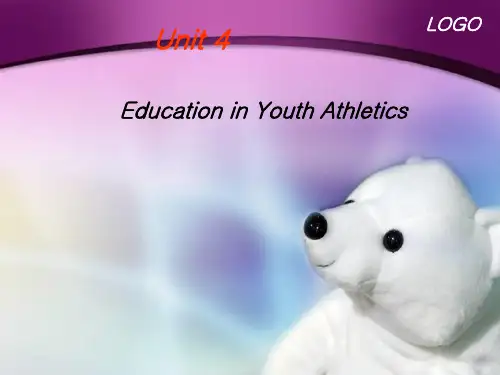
After—class reading课文翻译(Book 4)Unit 1致命诱惑1英国离奇谋杀案小说的女皇,毫无疑问是阿加莎·克里斯蒂。
虽然作者本人在20多年前就去世了,但她创作的78部侦探小说还是非常畅销。
它们已经被译成了100多种语言,销量超过了20亿册。
2阿加莎的小说无论是在英国还是在其他国家,都如此受人喜爱并不难理解。
她的每本书都构思精巧。
她创造的人物一眼就能辨认出,情节的发展非常规范、准确、流畅。
但最重要的是,她所有的故事都给读者一个谜团。
3克里斯蒂的作品几乎都是以谋杀开场,迫使读者提出这样一个问题:“是谁干的?”,而最后总是水落石出。
读者的乐趣就在于根据故事里隐含的线索顺藤摸瓜,试图在作者揭开谜底之前找到正确答案。
这种模式吸引了人类最强烈的本能——好奇心——而人们对这种模式欢迎的程度没有任何减弱的迹象。
4很多离奇的案子都是由克里斯蒂笔下某个常常出场的侦探破解,例如那个非常自信的比利时人埃居尔·波洛探长,或者是那个显然没有恶意的小老太太马普尔小姐。
她同时也为她的故事创造了一个特有的背景,这一背景,如同她创作的一些人物一样为人们所熟知。
那是处于两次世界大战之间的英国,那儿的小村庄里社区关系紧密,生活安静,或者是城里的阔佬们在乡下的豪宅里度周末。
5这个世界有着严格的社会等级制度。
乡下宅子的主人,很可能是贵族成员,占据着社会的顶层,然后是那些职业阶层:医生、律师和商人。
处于底层的则是一般民众,在书中通常作为仆从、厨师和园丁出场。
当谋杀案发生时,需要调查的嫌疑人不在少数。
6阿加莎-克里斯蒂的世界不是一个完全真实的世界,这就是她的作品还没有过时的原因之一。
这是一个安定、循规蹈矩的世界,然后谋杀案打乱了人们的正常生活。
Unit 1 Genius And the Craftsman 天才与工匠Robert Frost 罗伯特·弗罗斯特Many people admire writers for their exquisite stories, but few of them know with what painstaking efforts writers work to bring a story into the world. The following essay discusses the process of conceiving a story and developing it into a perfect work of art.许多人羡慕作家们的精彩小说,但却很少有人知道作家们是如何辛勤笔耕才使一篇小说问世的。
以下的短文将讨论小说的酝酿过程,以及作家是如何将这小说雕琢成一件精致完美的艺术品。
Once on the edge of a woods at twilight I came upon a small peach tree in flower. I stayed there watching until the light was gone. I saw nothing of the tree's origin, nothing of the might which had forced open a pit you could break your teeth on, and nothing of the principle which held it separate from the oaks and the grasses. All that appeared to me was a profound and eerie grace. 有一次,我在暮色中来到小树林边一棵鲜花盛开的小桃树前。